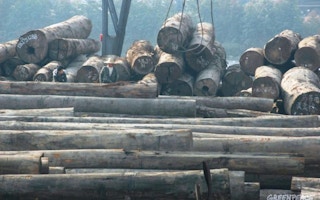Indonesia has signed a landmark trade agreement with the European Union that guarantees no illegal timber is exported from the country to the northern region from 2013 - a move that critics will be watching closely.
Signed this afternoon in Jakarta by Indonesia’s Minister of Forestry, Zulkifli Hasan, and EU Trade Commissioner Karel De Gucht, the voluntary agreement is both the first of its kind in Asia and the largest globally to date.
EU Trade representatives welcomed the move as a promising way to promote trade and decrease deforestation at the same time.“This regulation will support our quest for a level playing field in the market, encouraging buyers to purchase legal and sustainable timber, and therefore supporting producers who act responsibly,” said Andre De Boer, secretary general for European Timber Trade Federation.
Under the EU Timber Regulation, which takes effect in 2013, EU timber importers must prove their sources are legal. Companies that import wood products under EU voluntary agreements such as the pact signed today will be exempt from this requirement. With a simplified import process, Indonesian timber products will have a competitive advantage over timber from other sources that require additional verification.
The EU imports an average of US$1.2 billion in Indonesian timber and paper products annually, accounting for 15 per cent of the Southeast Asian country’s wood product exports. The European Forestry Institute (EFI), an international NGO established by European states, estimates from unofficial sources that roughly 40 to 50 per cent of Indonesia’s US$9 billion in wood exports are from illegally harvested timber.
Illegal logging in Indonesia has proved notoriously difficult to stop given the vast size of the republic’s forests and the complexity of its land rights issues - Indonesia is the third-largest tropical forest nation, and has frequently conflicting policies on land ownership and forestry concessions.
These same issues have delayed the signing of a promised two-year government moratorium on new forest concessions that Indonesia needs to fulfil its obligations under its US$ 1 billion REDD+ agreement with Norway. REDD, or Reducing Emissions from Deforestation and Forest Degradation, refers to the scheme under which developing countries receive aid in exchange for reducing deforestation of forests. Indonesia is the largest emitter of carbon due to deforestation, and has pledged to cut those emissions by 25 per cent by 2020.
A system to stopping illegal logging will help Indonesia reach that target, according to a statement in today’s agreement.
EU representatives and Indonesian officials believe that after four years of intense negotiations that included civil society groups, industry and local and regional governments, they have come up with a system that will work.
The EU started its voluntary partnerships agreements as a result of its Forest Law Enforcement, Governance and Trade (FLEGT) Action Plan in 2003. The purpose of the agreements is to improve forest sector governance and ensure that the timber products imported into the EU are produced in compliance with the laws and regulations of the partner country.
Under the agreements, partner countries develop control systems to verify the legality of their timber exports to the EU. The EU provides support to establish or improve these control systems. Once ratified and implemented, a process that takes about nine months, the agreement is legally binding, committing both sides to trade only in verified legal timber products.
Within Asia, similar voluntary agreements are under negotiation in Malaysia and Vietnam. In Africa, agreements have been signed with Ghana, Cameroon, Republic of Congo and the Central African Republic, and are under negotiation with Liberia, Gabon and Democratic Republic of the Congo.
Indonesia’s agreement, dubbed a ‘significant breakthrough’ by Minister Zulkifli, outlines a national system for auditing and verifying all sources of timber harvested for export, not only to the EU, but to all destinations.
Timber export companies will be audited annually by independent verifiers. Companies that fail to prove the authenticity of their sources will not be allowed to export and may face criminal charges. So far, 13 auditing companies have verified legal production from 1.1 million hectares of forest and 51 factories.
The agreement’s creators recognise the dangers of corruption and lack of monitoring in the system. Community oversight is built in and forest communities, which in Indonesia include about 30 million people, will have the means to push for suspension of a company’s timber exports if they find evidence of illegal activity.
Indonesia’s EU FLEGT facilitator Andy Roby told Eco-Business that independent monitoring is a key part of the scheme. “There are about 40 NGOs from around Indonesia getting trained up to do the work and submit the complaints based on evidence they collect,” he said.
Mr Roby admits that, although the mechanisms for oversight of the timber industry are in place, monitoring will be a challenge. “I have no doubt they will find it tough and one of the key factors will be getting information on permits and concessions. Their rights to get this information are clearly described in one of the annexes to the VPA (Voluntary Partnership Agreement), including where to go and how to request it.
“It needs testing…further support and training will be needed to help make sure the system works; the media also will have a key role to play in ensuring transparency,” he said.










